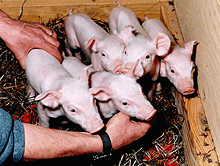

 |
 |
 |
 |
 |
 |
 |
 |
 |
 | ||||||||
| |||||||||
| Wednesday, March 15, 2000, updated at 10:09(GMT+8) Sci-Tech UK Firm Says Creates First Cloned Pigs
PPL Therapeutics Plc, the British biopharmaceutical company that helped to clone Dolly the sheep, has created the world's first cloned pigs. The birth of the five cloned piglets -- Millie, Christa, Alexis, Carrel and Dotcom -- on March 5 could herald a new age in animal-to-human organ transplants, or xenotransplantation. Up to 68,000 people in the United States and 50,000 in Europe are waiting for livers, kidney and hearts. The lists increase by 15 percent a year while the number of organ donors are dwindling. Scientists believe genetically engineered pigs, which can be bred quickly and whose organs as about the same size as humans, could solve the problem. "It opens the door to making modified pigs whose organs and cells can be successfully transplanted into humans -- the only near-term solution to solving the world-wide organ shortage crisis," PPL said. The company, whose shares rose 19 percent to a record high of 195 pence on the news, valuing the Edinburgh-based group some 96 million pounds ($150.9 million), said it expects to begin clinical trials in the next four years. "All the known technical hurdles have been overcome. It is now a case of combining the various strategies into one male and one female pig, and breeding from these," PPL managing director Ron James said in the company statement. "An end to the chronic organ shortage is now in sight." Analysts estimate the market for organ transplants could be worth $10 billion a year. Cellular therapies, in which altered cells are transplanted to humans to treat conditions such as diabetes, would add considerably more to that sum. "It would be reasonable if they can get into the clinic within four years. This is the most difficult step. The rest of the barriers are more dealable," Erling Refsum, of Nomura Securities, told Reuters. "Dolly was a scientific breakthrough but this is bigger. This puts them clearly up front in doing something that no one else can do. Dolly is just a way to make medicines cheaply. This (pig) definitely puts them in the big league," he added. The piglets were cloned by PPL's U.S. staff in Blacksburg, Virginia, partly supported by the U.S. government's National Institute of Standards and Technology. The five piglets were cloned from adult cells using nuclear transfer, the same technique used to create Dolly. The PPL scientists hope to go one step further by inactivating a gene that scientists suspect is involved in the human rejection of pig organs. One of the biggest problems doctors face in transplant surgery is rejection of the donor organ by the recipient. Immunosuppressive drugs have increased the success rate of human organs transplant. PPL scientists plan to "knock out" a gene called alpha 1-3 gal transferase which helps to produce a sugar in pig cells that the human immune system recognises as foreign. "PPL has built up the technical expertise and intellectual property to be the first to produce the type of pig which should become the industry standard for xenotransplantation -- a pig lacking the alpha 1-3 gal transferase gene," Alan Colman, PPL's research director said. Printer-friendly VersionBack to top |
 Relevant Stories  Internet Links |